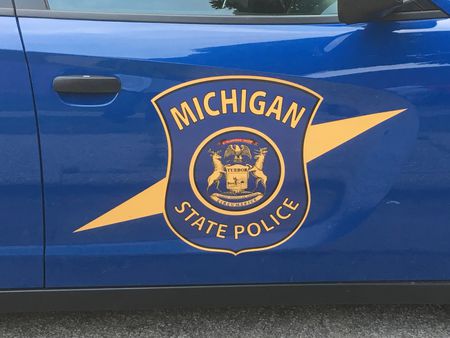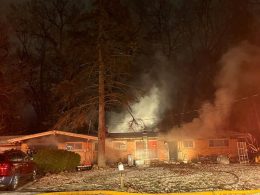LANSING, Mich. – At least a dozen employees at the Accident Fund Insurance Co. of America headquarters in Lansing have said they’ve been unfairly required to report to work during the pandemic. The common thread: They’re all members of UAW Amalgamated Local No. 2256.
“The vast majority of us are union members. That seems to be the only justification,” one Accident Fund employee told City Pulse under the condition she could remain anonymous. “Most of the higher-ups, the bosses, have all been working from home since the early spring.”
State officials last month received at least two employee complaints from Accident Fund, a subsidiary of Blue Cross Blue Shield Michigan headquartered on Grand Avenue in downtown Lansing. The allegation: Hundreds of employees are being illegally called into work every day.
“We’re averaging a new COVID-19 case there every single day,” said another Accident Fund employee, who has also been granted anonymity for this story. “Sometimes there are two or three cases reported in a day. They’ve moved us around and spaced us apart, but I’d still say that 75% of the people coming into the building everyday should not be required to come in.”
Under the latest emergency epidemic orders from the Michigan Department of Health and Human Services, all work should be done from home unless it is “strictly necessary” for an employee to be in the office. That carve-out also shouldn’t be construed as permitting in-person work only because remote options are inconvenient or costly, according to state officials.
Emails obtained by City Pulse showed that the Michigan Occupational Safety and Health Administration followed up last month on one complaint at Accident Fund that alleged it was unnecessary for hundreds of employees — mostly union members — to come into the office.
State officials, at the time, deemed the Accident Fund to be “medium or lower exposure risk” and opted against a physical inspection, emails showed. They also provided a list of suggestions and “steps you need to take if the allegations are true, so you can prevent your employees from contracting coronavirus and are in compliance with our regulations.”
A state spokesperson confirmed that at least one more staff complaint has since been filed but declined to provide additional information, except to note that state officials are still processing complaints “as quickly as possible” amid a growing backlog of workplace safety allegations.
In the meantime, corporate officials at Accident Fund have refused to shed light on workplace practices, noting only that 60% of the staff has been allowed to work from home since March and that they will continue to “maintain and adjust” procedures as necessary to ensure safety.
Calls to union leadership at UAW Local No. 2256 — which represents claims and customer service representatives, information technology staff, business analysts, fraud investigators, mailroom staff and maintenance staff at Accident Fund — were not returned.
Several employees have said that Accident Fund’s policies only mirror that of its parent company, Blue Cross Blue Shield Michigan and BCBSM’s office on Capitol Avenue in Lansing.
Officials there said the vast majority of the 160 staffers reporting to work are union members.
“It just so happens that in our operational areas and in our customer service areas, the employees in those areas are represented collectively by the UAW,” explained Andy Hetzel, vice president for communications for Blue Cross Blue Shield of Michigan. “That’s just how it is.”
It’s more about coincidence than intentionally sending the union to the frontline, Hetzel said.
Only about 1,600 of 7,500 employees still report to the office across the Blue Cross Blue Shield Michigan network, including half the staff of its Lansing offices, Hetzel said. And he said that staff has been deemed “necessary” to ensure that $72 million in claims can be processed daily.
Hetzel wouldn’t elaborate on practices at Accident Fund, but the union-backed staff at Blue Cross Blue Shield is also about ensuring private customer data remains secure, he said.
“Our facilities, our building, our IT infrastructure and our proprietary membership systems are all configured to ensure the safe handling of members’ protected healthcare information,” Hetzel added. “Our offices and our facilities provide a secure environment to process that information.”
Hetzley said he wasn’t surprised to hear about employee complaints, insisting that each of them will be addressed as quickly as possible. How will they be addressed? He declined to elaborate, also noting that BCBSM has no immediate plans to change its current work-from-home policies.
“It’s understandable in this environment, where you don’t necessarily know where the virus is lurking, that people would be concerned about anytime they venture out — whether that’s for work or the grocery store,” Hetzel added. “We’re still taking every precaution. There’s an assumption that you go to a certain place, you get sick. That’s an invalid assumption.”
Still, several employees are “fed up” with the disparate treatment for union staff, they argued. And they’re hoping a series of complaints to MIOSHA will trigger more rapid state intervention.
“We’ve brought these complaints through every rung of the corporate ladder,” one Accident Fund employee told City Pulse this week. “Nothing is changing. It’s going absolutely nowhere.”
Prior to the pandemic, MIOSHA received an average of 200 monthly complaints and tracked a response time of about five days. Since March, the agency has fielded 11,000 complaints — including 2,800 in November. The backlog is leading to some processing delays, officials said.
Ingham County Health Officer Linda Vail also said she has no authority over the recent complaints against Accident Fund. Companies can have several reasons for determining which employees must report to work. And the Health Department isn’t prepared to evaluate them, she said.
“That’s MIOSHA,” Vail said. “Not my call to second guess their workflow and processes.”












